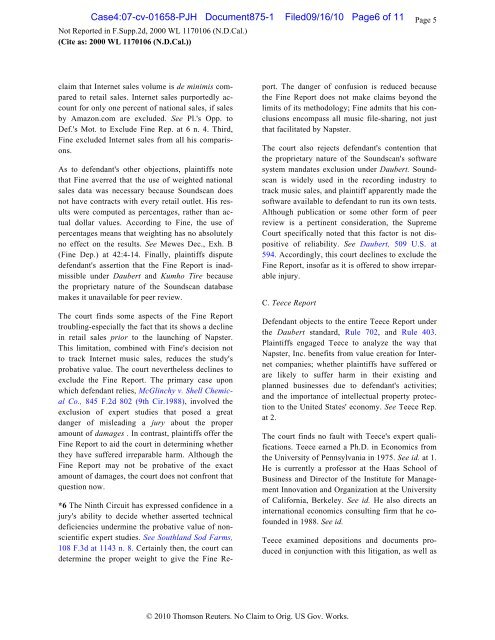exhibit 2 - SAP Lawsuit Portal
exhibit 2 - SAP Lawsuit Portal
exhibit 2 - SAP Lawsuit Portal
You also want an ePaper? Increase the reach of your titles
YUMPU automatically turns print PDFs into web optimized ePapers that Google loves.
Case4:07-cv-01658-PJH Document875-1 Filed09/16/10 Page6 of 11<br />
Not Reported in F.Supp.2d, 2000 WL 1170106 (N.D.Cal.)<br />
(Cite as: 2000 WL 1170106 (N.D.Cal.))<br />
claim that Internet sales volume is de minimis compared<br />
to retail sales. Internet sales purportedly account<br />
for only one percent of national sales, if sales<br />
by Amazon.com are excluded. See Pl.'s Opp. to<br />
Def.'s Mot. to Exclude Fine Rep. at 6 n. 4. Third,<br />
Fine excluded Internet sales from all his comparisons.<br />
As to defendant's other objections, plaintiffs note<br />
that Fine averred that the use of weighted national<br />
sales data was necessary because Soundscan does<br />
not have contracts with every retail outlet. His results<br />
were computed as percentages, rather than actual<br />
dollar values. According to Fine, the use of<br />
percentages means that weighting has no absolutely<br />
no effect on the results. See Mewes Dec., Exh. B<br />
(Fine Dep.) at 42:4-14. Finally, plaintiffs dispute<br />
defendant's assertion that the Fine Report is inadmissible<br />
under Daubert and Kumho Tire because<br />
the proprietary nature of the Soundscan database<br />
makes it unavailable for peer review.<br />
The court finds some aspects of the Fine Report<br />
troubling-especially the fact that its shows a decline<br />
in retail sales prior to the launching of Napster.<br />
This limitation, combined with Fine's decision not<br />
to track Internet music sales, reduces the study's<br />
probative value. The court nevertheless declines to<br />
exclude the Fine Report. The primary case upon<br />
which defendant relies, McGlinchy v. Shell Chemical<br />
Co., 845 F.2d 802 (9th Cir.1988), involved the<br />
exclusion of expert studies that posed a great<br />
danger of misleading a jury about the proper<br />
amount of damages . In contrast, plaintiffs offer the<br />
Fine Report to aid the court in determining whether<br />
they have suffered irreparable harm. Although the<br />
Fine Report may not be probative of the exact<br />
amount of damages, the court does not confront that<br />
question now.<br />
*6 The Ninth Circuit has expressed confidence in a<br />
jury's ability to decide whether asserted technical<br />
deficiencies undermine the probative value of nonscientific<br />
expert studies. See Southland Sod Farms,<br />
108 F.3d at 1143 n. 8. Certainly then, the court can<br />
determine the proper weight to give the Fine Re-<br />
port. The danger of confusion is reduced because<br />
the Fine Report does not make claims beyond the<br />
limits of its methodology; Fine admits that his conclusions<br />
encompass all music file-sharing, not just<br />
that facilitated by Napster.<br />
The court also rejects defendant's contention that<br />
the proprietary nature of the Soundscan's software<br />
system mandates exclusion under Daubert. Soundscan<br />
is widely used in the recording industry to<br />
track music sales, and plaintiff apparently made the<br />
software available to defendant to run its own tests.<br />
Although publication or some other form of peer<br />
review is a pertinent consideration, the Supreme<br />
Court specifically noted that this factor is not dispositive<br />
of reliability. See Daubert, 509 U.S. at<br />
594. Accordingly, this court declines to exclude the<br />
Fine Report, insofar as it is offered to show irreparable<br />
injury.<br />
C. Teece Report<br />
© 2010 Thomson Reuters. No Claim to Orig. US Gov. Works.<br />
Page 5<br />
Defendant objects to the entire Teece Report under<br />
the Daubert standard, Rule 702, and Rule 403.<br />
Plaintiffs engaged Teece to analyze the way that<br />
Napster, Inc. benefits from value creation for Internet<br />
companies; whether plaintiffs have suffered or<br />
are likely to suffer harm in their existing and<br />
planned businesses due to defendant's activities;<br />
and the importance of intellectual property protection<br />
to the United States' economy. See Teece Rep.<br />
at 2.<br />
The court finds no fault with Teece's expert qualifications.<br />
Teece earned a Ph.D. in Economics from<br />
the University of Pennsylvania in 1975. See id. at 1.<br />
He is currently a professor at the Haas School of<br />
Business and Director of the Institute for Management<br />
Innovation and Organization at the University<br />
of California, Berkeley. See id. He also directs an<br />
international economics consulting firm that he cofounded<br />
in 1988. See id.<br />
Teece examined depositions and documents produced<br />
in conjunction with this litigation, as well as


